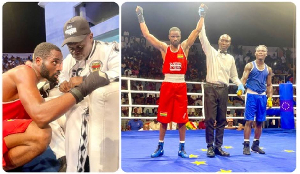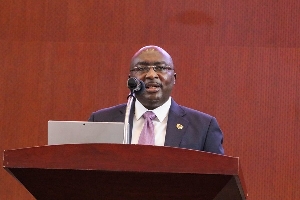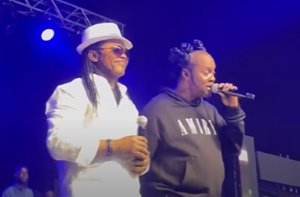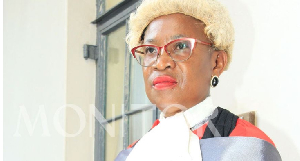- Home - News
- TWI News | TV
- Polls
- Year In Review
- News Archive
- Crime & Punishment
- Politics
- Regional
- Editorial
- Health
- Ghanaians Abroad
- Tabloid
- Africa
- Religion
- Election 2020
- Coronavirus
- News Videos | TV
- Photo Archives
- News Headlines
- Press Release
General News of Friday, 8 August 2003
Source: GNA
Some of human rights abuse stories are true- Amuah-Sekyi
Sekondi, August 8, GNA- Mr Justice K. E. Amuah-Sekyi, Chairman of the National Reconciliation Commission (NRC), said on Friday that even though most of the atrocities and other human rights abuses committed under past regimes seemed unbelievable they were incidents that happened.
"Some of the stories being told are very unusual, nevertheless, they are true, and we must pray that they never happen again in this country, and each and everyone must work to sustained our freedom."
Mr Justice Amuah-Sekyi said this after a petitioner, Mr Alex Kwasi Boye, 85, narrated how he and his friend Kwadwo Ansong were arbitrarily arrested in Kumasi in 1962 and detained for four years.
He said at the Nsawam Prisons he slept on the bare floor with a bright light that was on for 24 hours.
He was taken out of his cells every two weeks to wash down and the excessive heat in the cells affected his sight and health in general. Since he was released in 1966 he had not been able to work to earn income.
Mr Boye said his children's education was affected and only one out of the nine could learn a vocation.
He told the Commission that in 1939, he travelled from his hometown Whindo near Takoradi to settle at Obo Kwahu where he and Ansong became friends but after sometime decided to move to Kumasi.
Mr Boye said Ansong, who visited him one day, went to town and was arrested by the police.
When he went to the police station to find out why his friend was arrested he was also arrested and the two were placed in cells. He said one day at dawn they were taken to Nsawam Prisons without being told of the offence they had committed.
Mr Boye said since he was released after the 1966 coup, no one had explained to him why he was detained.
Mr Justice Amuah-Sekyi told the audience that during enquiries at the prisons it was indicated that Mr Boye was one of the "unclassified detainees" at that time.
He said the Commission would make appropriate recommendation to the government to rehabilitate victims of human rights abuses.
Nana Kofi Bentil, a farmer at Bonsa near Tarkwa, told the Commission of how in 1986, one Mr Ohene Yaw, who had a protracted land dispute with him, used soldiers to maltreat him and his family.
He said his brother and a nephew died following severe beatings by the soldiers.
Nana Bentil said it was by divine intervention that he is still alive because at one time four armed soldiers went to his house and ordered his wife and children to leave the room because they were going to kill him.
He said they asked him to say his last prayers whilst he faced the wall and as he prayed he fell into a trance.
When he heard a shot he came back to himself and thinking that he had been wounded, inspected his body and heard one of the soldiers say, "You have been saved by your God."
The bullets perforated the roofs of the room, indicating that, somehow the gun miraculously failed to hit its target.
He said he was placed in a guardroom at the Apremdo military barracks and a lorry tyre put around his neck and was told that he was going to be burnt.
Nana Bentil said many people were killed by soldiers between 1982 and 1986 and said one of the soldiers known only as "killer" was responsible for most of the atrocities committed in and around Tarkwa.
He said the soldiers used a particular area called "ABA" where an old shaft of the Goldfields was used for executions.
Another petitioner Mr. Abass Mohammed told the Commission of how his brother, Yamba Gyima was stabbed by soldiers from the Ghana Navy on 31st December 1971.










